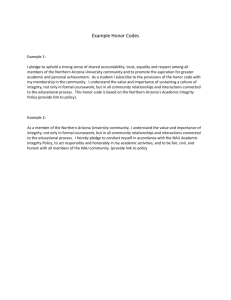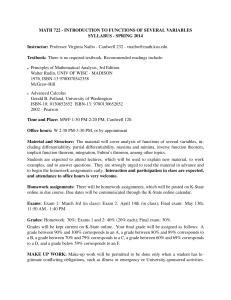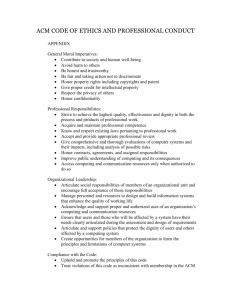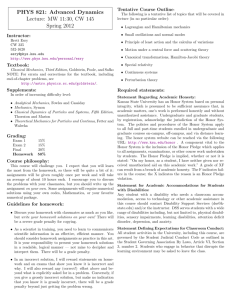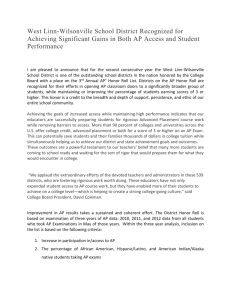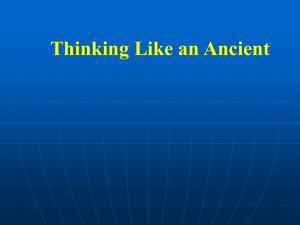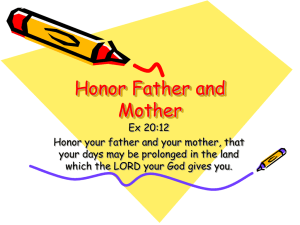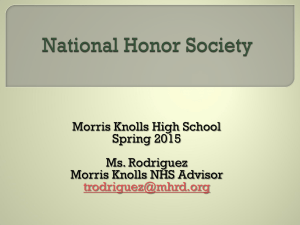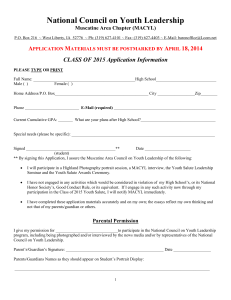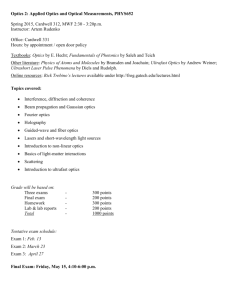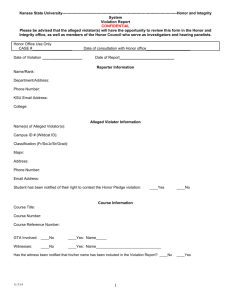BIOL 612 LIMNOLOGY FALL 1996
advertisement
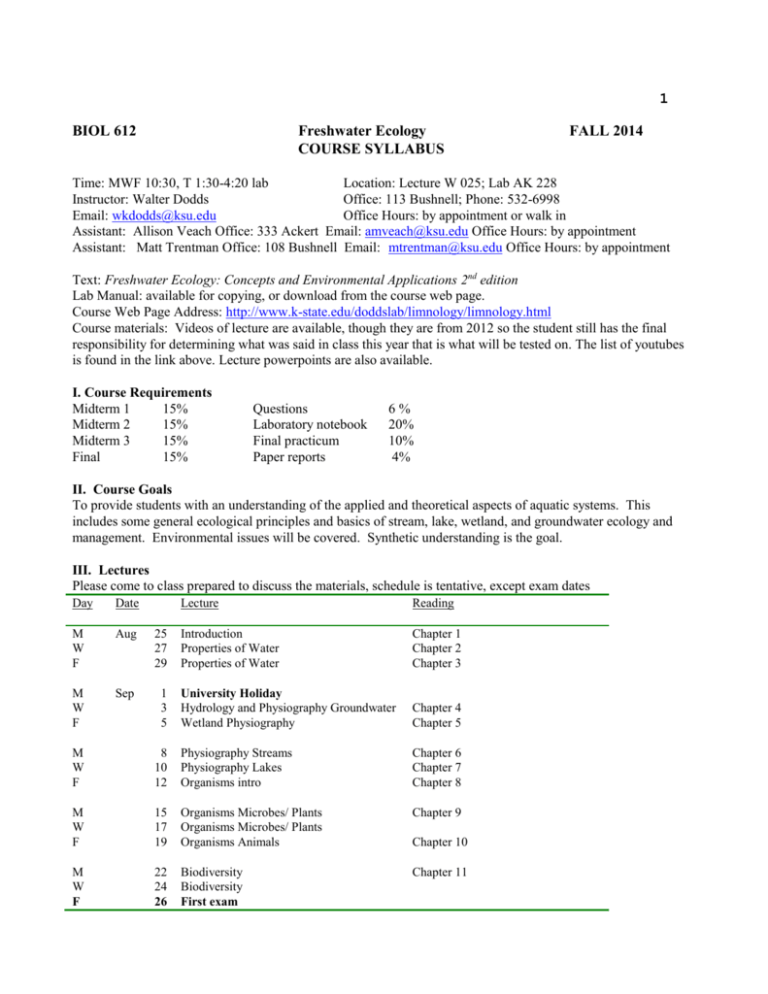
1 BIOL 612 Freshwater Ecology COURSE SYLLABUS FALL 2014 Time: MWF 10:30, T 1:30-4:20 lab Location: Lecture W 025; Lab AK 228 Instructor: Walter Dodds Office: 113 Bushnell; Phone: 532-6998 Email: wkdodds@ksu.edu Office Hours: by appointment or walk in Assistant: Allison Veach Office: 333 Ackert Email: amveach@ksu.edu Office Hours: by appointment Assistant: Matt Trentman Office: 108 Bushnell Email: mtrentman@ksu.edu Office Hours: by appointment Text: Freshwater Ecology: Concepts and Environmental Applications 2nd edition Lab Manual: available for copying, or download from the course web page. Course Web Page Address: http://www.k-state.edu/doddslab/limnology/limnology.html Course materials: Videos of lecture are available, though they are from 2012 so the student still has the final responsibility for determining what was said in class this year that is what will be tested on. The list of youtubes is found in the link above. Lecture powerpoints are also available. I. Course Requirements Midterm 1 15% Midterm 2 15% Midterm 3 15% Final 15% Questions Laboratory notebook Final practicum Paper reports 6% 20% 10% 4% II. Course Goals To provide students with an understanding of the applied and theoretical aspects of aquatic systems. This includes some general ecological principles and basics of stream, lake, wetland, and groundwater ecology and management. Environmental issues will be covered. Synthetic understanding is the goal. III. Lectures Please come to class prepared to discuss the materials, schedule is tentative, except exam dates Day Date M W F Aug 25 27 29 M W F Sep 1 3 5 Lecture Reading Introduction Properties of Water Properties of Water Chapter 1 Chapter 2 Chapter 3 University Holiday Hydrology and Physiography Groundwater Wetland Physiography Chapter 4 Chapter 5 M W F 8 10 12 Physiography Streams Physiography Lakes Organisms intro Chapter 6 Chapter 7 Chapter 8 M W F 15 17 19 Organisms Microbes/ Plants Organisms Microbes/ Plants Organisms Animals Chapter 9 M W F 22 24 26 Biodiversity Biodiversity First exam Chapter 11 Chapter 10 2 M W Oct 29 1 General Chemistry & Redox Oxygen Chapter 12 (last drop day w/o a W) F 3 M W F 6 8 10 Carbon Nitrogen Sulfur M W F 13 15 17 Phosphorus and iron Extreme or Unusual Environments Toxic Chemicals M W F 20 22 24 Toxic Chemicals Second exam Extreme Environments M W F 27 29 31 Nutrient use Nutrient Limitation Chapter 17 (last day to drop) 3 5 7 Eutrophication Eutrophication Eutrophication Chapter 18 M W F 10 12 14 Guest lecture Micro-ecology Micro-ecology M W F 17 19 21 Predation Predation Other interactions M W F 24 26 28 University Holiday University Holiday Thanksgiving M W F M W F Nov Dec 1 3 5 Photosynthesis Community Ecosystems Third exam Chapter 13 Chapter 14 Chapter 15 Chapter 16 Chapter 19 Chapter 20 Chapter 21 Chapter 22 Chapter 24 M 8 Ecosystems W 10 Ecosystems F 12 Prospects for the future, final review Chapter 25 Tues 15 Final examination 11:50 Use lab time? ‘Question of the day’ is required for every class. Each question is worth 2 points, 1 point for effort and one for content. Percent will be calculated as total points /(total classes*2-12). There will also be 1 extra credit test point for each unique error found in the text. We will schedule in 2 paper reports and you can choose from a list. This will be 1 paragraph written what you liked and did not like, and a 3-5 minute class presentation. Required Statements: 1. Statement Regarding Academic Honesty Kansas State University has an Honor System based on personal integrity, which is presumed to be sufficient assurance that, in 3 academic matters, one's work is performed honestly and without unauthorized assistance. Undergraduate and graduate students, by registration, acknowledge the jurisdiction of the Honor System. The policies and procedures of the Honor System apply to all full and part-time students enrolled in undergraduate and graduate courses on-campus, off-campus, and via distance learning. The honor system website can be reached via the following URL: www.ksu.edu/honor. A component vital to the Honor System is the inclusion of the Honor Pledge which applies to all assignments, examinations, or other course work undertaken by students. The Honor Pledge is implied, whether or not it is stated: "On my honor, as a student, I have neither given nor received unauthorized aid on this academic work." A grade of XF can result from a breach of academic honesty. The F indicates failure in the course; the X indicates the reason is an Honor Pledge violation. Any form of plagiarism will not be tolerated. Examples of plagiarism can be found at http://www.kstate. edu/honor/students/examples.htm. 2. Statements for Academic Accommodations for Students with Disabilities Any student with a disability who needs a classroom accommodation, access to technology or other academic assistance in this course should contact Disability Support Services (dss@k-state.edu) and/or the instructor. DSS serves students with a wide range of disabilities including, but not limited to, physical disabilities, sensory impairments, learning disabilities, attention deficit disorder, depression, and anxiety. 3. Statement Defining Expectations for Classroom Conduct All student activities in the University, including this course, are governed by the Student Judicial Conduct Code as outlined in the Student Governing Association By Laws, Article VI, Section 3, number 2. Students who engage in behavior that disrupts the learning environment may be asked to leave the class. Kansas State University is a community of students, faculty, and staff who work together to discover new knowledge, create new ideas, and share the results of their scholarly inquiry with the wider public. Although new ideas or research results may be controversial or challenge established views, the health and growth of any society requires frank intellectual exchange. Academic freedom protects this type of free exchange and is thus essential to any university’s mission. Moreover, academic freedom supports collaborative work in the pursuit of truth and the dissemination of knowledge in an environment of inquiry, respectful debate, and professionalism. Academic freedom is not limited to the classroom or to scientific and scholarly research, but extends to the life of the university as well as to larger social and political questions. It is the right and responsibility of the university community to engage with such issues.

